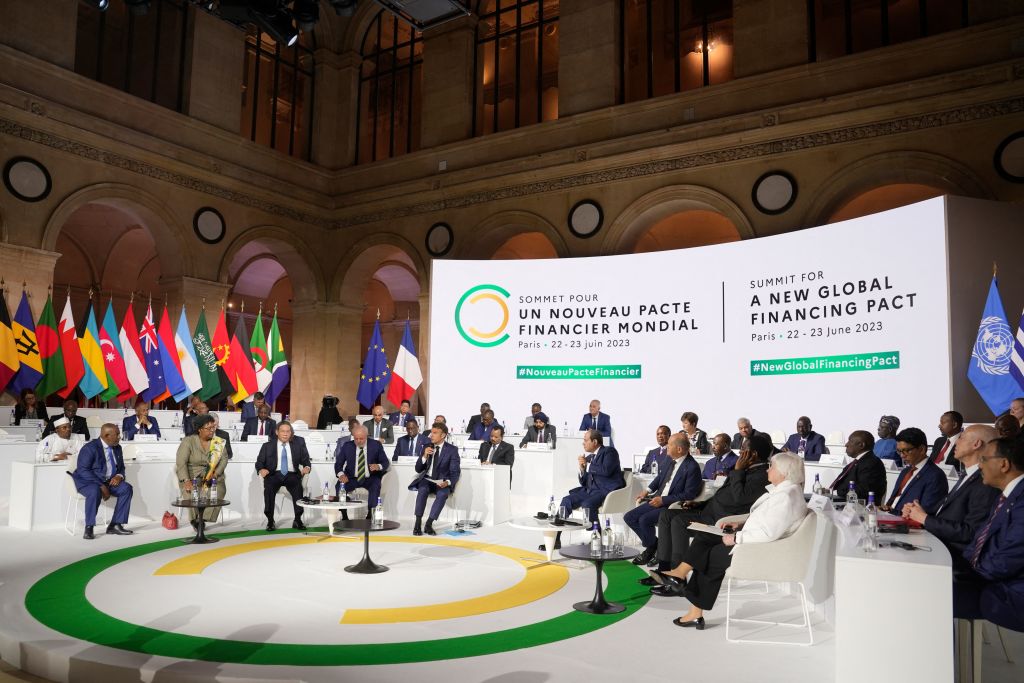
The world leaders who gathered in Paris last week for the Summit for a New Global Financing Pact have vowed to mobilise resources to support developing countries grappling with debt crises and to empower them to assume a larger role in global governance. While these are worthy goals, such high-profile summits often yield little more than group photographs and empty pledges.
Even so, the Paris meeting is significant because it set the stage for a series of leaders’ summits in September: the G20 meeting in New Delhi, the Finance in Common gathering in Colombia, and the United Nations’ SDG Summit in New York.
The efficacy of these summits becomes even more important given what is at stake. The increase in extreme poverty over the past three years, together with the growing frequency of humanitarian and natural disasters, many of them caused by climate change, underscores countries’ need to build resilience.
But international cooperation is declining just when we need it most. Developing countries feel excluded from a decision-making process that puts wealthy countries’ needs first, whether in the context of the Covid-19 pandemic or by prioritising Ukraine’s security over theirs. Clearly, catalysing effective cooperation requires a more concerted effort.
This is not to say that international summitry cannot lead to meaningful change. The G20 summits held in Washington in November 2008 and in London in April 2009, for example, averted a global economic meltdown and reshaped the financial system. And the 1944 UN Monetary and Financial Conference in Bretton Woods, New Hampshire, which began and concluded with one-day leaders’ summits, laid the foundations for international economic governance as we know it.
There are, however, several core elements that are crucial to the success of international summits. The balance of power in the room—specifically, the alignment between what attendees can actually implement and what they can agree on—is critical.
Another important element is participation. The leaders of many developing countries attended the Paris meeting, including Niger, Egypt, South Africa, Colombia, Tunisia, Sri Lanka, Nigeria, Barbados, Saudi Arabia and Pakistan. The heads of multilateral institutions such as the International Monetary Fund, the World Bank, the African Development Bank, the Inter-American Development Bank and major non-government organisations also participated. Many G20 leaders, however, were notably absent.
For developing-country leaders, the Paris summit was a unique opportunity to communicate their needs to their wealthier-country counterparts and the heads of international organisations. The World Bank, for example, could accelerate the implementation of its plan to increase lending capacity by US$50 billion over the next decade. The IMF could propose more ambitious ways to increase the funds available to developing countries. It could also advocate improved methods of restructuring or forgiving sovereign debt, building on its own efforts and those of others to suspend repayments in the event of a climate disaster or a pandemic. Moreover, by improving efficiency and fostering cooperation, multilateral institutions could maximise their impact.
But to increase multilateral lenders’ resources and tools, or to implement innovative financing ideas such as an international tax on carbon emissions from shipping, G20 countries must forge a consensus. Imposing a shipping tax, for example, requires reaching an agreement on its implementation and the allocation of expected revenues. Currently, there are several competing claims.
The problem is that the heads of some major shareholding governments are missing. US President Joe Biden and Indian Prime Minister Narendra Modi, for example, didn’t attend the Paris summit, meeting in Washington instead. With the United States approaching an election year and Republicans decrying international institutions’ anti-fossil-fuel stance, the Biden administration is focused on other issues. Modi is also focused on an election next year and has already leveraged India’s G20 presidency to launch the Global Sovereign Debt Roundtable with the IMF and the World Bank, as well as an expert group on strengthening multilateral development banks.
More broadly, prime ministers and presidents jostle among each other for center stage when it comes to global cooperation. We saw a bit of that last week as the United Kingdom and Ukraine competed for participants in their Ukraine Recovery Conference, which overlapped with the Paris summit.
In addition to the absence of G20 leaders, the Paris summit and other gatherings have lacked adequate preparation, which reduces the likelihood of reaching viable agreements on goals and policies. As the political scientist Robert Putnam famously observed in his groundbreaking study of the 1978 G7 meeting in Bonn, preparation can make or break a summit. A dynamic preparation process can help political leaders marshal support for international agreements by broadening the range of policies that domestic interest groups would find acceptable (their ‘win-set’).
During the 1978 G7 summit, for example, the German government faced pressure from the Bundesbank, the finance ministry, the business and banking communities, and the Free Democratic Party, a key member of the governing coalition, to oppose a global economic stimulus package. Only a small group of officials from the chancellor’s office and economy ministry, together with the Social Democrats and trade unions, advocated a more expansionary economic policy. But the G7 negotiations created an opportunity for the expansionists to make their case and, ultimately, secure a modest victory.
Upcoming summits must lay the groundwork for future global cooperation. Without actively building public support in participating countries for the commitments made by their leaders, the emergence of overlapping and potentially transformative win-sets is highly unlikely.
A satirical cartoon once depicted a G7 summit, with one leader saying, ‘If we don’t have to do what we promise, let’s agree to eradicate all poverty.’ Such cynicism is a luxury we can no longer afford. In today’s rapidly fragmenting world, leaders must meet, engage in meaningful discussion and take decisive action to foster effective cooperation. Thoroughly prepared, well-attended summits would be a good place to start.

